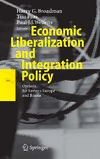
Economic Liberalization and Integration Policy: Options for Eastern Europe and Russia PDF
354 Pages·2006·22.295 MB·English
Most books are stored in the elastic cloud where traffic is expensive. For this reason, we have a limit on daily download.
Preview Economic Liberalization and Integration Policy: Options for Eastern Europe and Russia
Description:
After the 1998 Russian economic crisis, there are new opportunities for sustained growth in many countries of the former Soviet Union. Against this backdrop, the authors of this book analyze the dynamics of macroeconomic and structural developments in Eastern Europe and Russia, with special attention paid to problems of international and national integration, ''Dutch disease'' and natural resource dependency, and distortions in institutional reforms. The analysis also sheds light on how these problems have implications for cooperation among OECD-countries. A critical focus is on institutional adjustment and learning, human capital formation, trade and foreign investment. The political economy challenges of stability and growth in the region are highlighted. New empirical findings and comparative policy analysis - including in the field of natural resource policy - are major elements in this publication.
See more
The list of books you might like
Most books are stored in the elastic cloud where traffic is expensive. For this reason, we have a limit on daily download.
